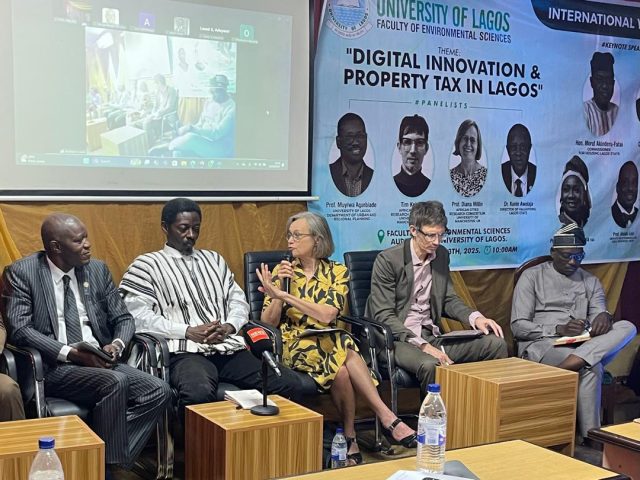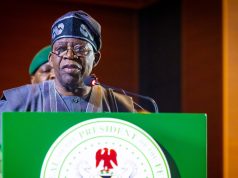A Professor of Urban and Regional Planning at the University of Lagos (UNILAG), Akoka, Muyiwa Agunbiade, has said about 70 per cent of properties in Lagos, Nigeria’s commercial nerve centre, are not captured in the government’s registry.
Mr Agunbiade also disclosed that no Nigerian state has a cadastral map which provides exact locations and ownership of landed properties.
He said Nigerians only mistake base maps for cadastral maps, insisting that their interchangeable use is not only inappropriate but also deceptive.
Mr Agunbiade spoke recently at a workshop organised by UNILAG’s Faculty of Environmental Sciences. It was part of the activities to mark the university’s 2025 edition of the annual International Week programme.
He said the failure of the government to get these properties properly captured has also denied the government access to supposedly accruable revenues, adding to the poor accountability on the part of tax collectors.
He spoke on the theme: “Digital Innovations and Property Tax in Lagos.”
The programme, which was organised in partnership with the African Cities Research Consortium (ACRC), featured the Chief Executive Officer (CEO) of the University of Manchester-based organisation, Diana Mitlin, a professor; ACRC’s Co-Research Fellow, Tim Kelsall, and the ACRC Lead in Ghana, Farouk Braimah, who participated as panellists.
Also on the panel were the Director of the Lagos State Valuation Office, Kunle Awolaja, and the Representative of Aphabeta Consulting Limited Liability Partnership, Abayomi Yusuf. The Director of Finance and Accounts at the Lagos State Ministry of Housing, Adefunke Adewale, represented the ministry’s Commissioner, Moruf Akinderu-Fatai.

Unregistered properties
According to Mr Agunbiade, land development and administration have so much to contribute to the effectiveness of property tax globally, noting that the existing system in Lagos, though regulated by planning laws, is outdated and has given room for informal growth.
He said that though innovations such as remote sensing and smart zoning could help to address the challenges, he identified poor infrastructure as a significant factor for poor control.
No cadastral mapping
The expert said that with functional cadastral mapping, scanning a property document will show a location that is properly georeferenced and the attributes of the landed property.
“So, we have a resemblance to the cadastral map in Abuja. Lagos has also been on this thing for quite some time now, maybe since around 2006 or so. When former Governor Babatunde Fasola was in office, I know they made some attempts, but because it is a very tricky and risky thing to do, because you really need to have the areas mapped out, you have to know the boundaries, describe the size, the use, and ownership before you claim you have a complete cadastral map, nothing much has been done,” he said.
On AI Impact
Mr Agunbiade advised Nigerians not to follow the bandwagon on the touting of the use of artificial intelligence, saying that beyond the fad of the new trends are issues of infrastructure and governing rules.
He said: “In Nigeria, sometimes ago we were talking about Sustainable Development, and then jumped to smart city, and from smart city we are discussing AI.
All these things are mere words; what will drive them is infrastructure which we don’t have. What we have is either not appropriate or inadequate.
“So, because the infrastructure is not there, it becomes difficult to do things. So, when you speak about smart cities, AI, and all those big grammars, the basic thing that is needed is infrastructure.
And it is not about the infrastructure alone, but also about commitment and our mindset to make things happen. If you don’t get things done properly, then another term will come, and we will rush to it again without achieving anything. Talking about a smart city, could we be smart without data and infrastructure to obtain the data?”
ACRC’s take
Meanwhile, in her contributions, the ACRC CEO, Mrs Mitlin, holds the view that property tax is a source of revenue for the government, which is expected to be used for the provision of infrastructure for the use of the people.
She said if a government prioritise judicious use of taxes collected, people will be encouraged to fulfil their obligations by paying taxes regularly and following the due processes.
The professor commended UNILAG for what she described as its deep commitment to moving forward with planning and development in the city of Lagos.
She said: “We have heard today that there have been a lot of challenges with tax compliance, and specifically, property tax is not easy.
I think one of the best ways is our commitment to using new forms of technology, the digital innovations. I think that is clearly important.
But I also think what people have shared here is getting the relationships right. I think the state government can support the revenue generation drive by developing the right tools and having a dialogue about what is possible and how everyone can contribute most effectively.”
Commissioner, Dean speak
In their separate remarks, the state’s Commissioner for Housing, Mr Akinderu-Fatai, agreed that in many developing states like Lagos, “manual systems, incomplete records, and limited coverage hamper property taxation”.
READ ALSO:Lack of AI skills, not degrees, keeping Nigerian graduates unemployed — Educationist
He noted that the state is currently piloting a digital house numbering and addressing system to assign every property in Lagos a unique digital identity.
He said, “Digital innovation in property tax is not merely about boosting revenue; it is about equity, transparency, and governance.”
The dean of the faculty and host of the event, Olumide Adenuga, a professor, commended the speakers at the event for sharing their thoughts on such an important subject of property tax, noting that, “In a rapidly urbanising city like Lagos, the challenge of sustainability, on managing land property and infrastructure is immense.”








